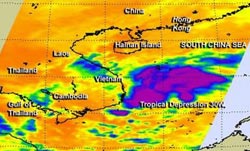NASA sees Tropical Depression 30W stretching out, fading

NASA's Aqua satellite passed over Tropical Depression 30W on Nov. 5 at 1:23 p.m. EST and saw that wind shear had stretched the system and the strongest thunderstorms from west to east.<br><br>Credit: NASA JPL, Ed Olsen<br>
NASA's Aqua satellite passed over Tropical Depression 30W on Nov. 5 at 18:23 UTC/1:23 p.m. EST.
The Atmospheric Infrared Sounder or AIRS instrument captured infrared data about the storm's cloud top temperatures. The AIRS data also showed wind shear had stretched the system from west to east.
On Nov. 6 Tropical Depression 30W was making landfall in southern Vietnam. At 0900 UTC/4 a.m. EST, the final warning from the Joint Typhoon Warning Center placed the center of the depression about 200 nautical miles/230.2 miles/370.4 km east-northeast of Ho Chi Minh City, Vietnam, near 10.9 north and 115.3 east.
It was moving to the west at 12 knots/13.8 mph/ 22.2 kph, and its maximum sustained winds had dropped to 25 knots/28.7 mph/ 46.3 kph.
Animated multispectral satellite imagery showed that thunderstorm development was shallow as the storm continued to stretch out.
Tropical Depression 30W is expected to dissipate over southern Vietnam in the next day, although the Joint Typhoon Warning Center noted that there is a chance of regeneration once the remnants move over the Gulf of Thailand or the Andaman Sea.
Media Contact
More Information:
http://www.nasa.govAll latest news from the category: Earth Sciences
Earth Sciences (also referred to as Geosciences), which deals with basic issues surrounding our planet, plays a vital role in the area of energy and raw materials supply.
Earth Sciences comprises subjects such as geology, geography, geological informatics, paleontology, mineralogy, petrography, crystallography, geophysics, geodesy, glaciology, cartography, photogrammetry, meteorology and seismology, early-warning systems, earthquake research and polar research.
Newest articles

Economies take off with new airports
A global study by an SUTD researcher in collaboration with scientists from Japan explores the economic benefits of airport investment in emerging economies using nighttime satellite imagery. Be it for…

CAR T–cell immunotherapy targets
Pan-cancer analysis uncovers a new class of promising CAR T–cell immunotherapy targets. Scientists at St. Jude Children’s Research Hospital found 156 potential CAR targets across the brain and solid tumors,…

Stony coral tissue loss disease
… is shifting the ecological balance of Caribbean reefs. The outbreak of a deadly disease called stony coral tissue loss disease is destroying susceptible species of coral in the Caribbean…





















